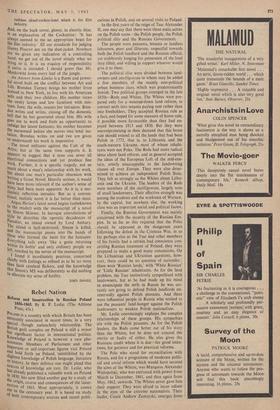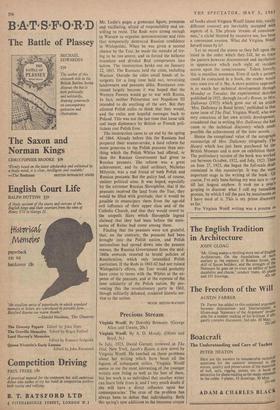Rebel Nation POLAND is a country with which Britain has
been intimately associated in recent times, in a very –special though melancholy relationship. The but guilt complex on Poland is still a minor Knowledge significant factor in international politics. Imlowledge of Poland is however a rare phe- nomenon. Members of Parliament and other important or self-important figures visit Poland and hold forth on Poland, uninhibited by the slightest knowledge of Polish language, literature Or history. In their defence one might plead that sources of knowledge are rare. Dr. Leslie, who h as already published a valuable work on Poland In 1830, has now filled another gap by a study of the origin, course and consequences of the insur- rection of 1863. Most appropriately, it comes out in the centenary year. It is based on study of both contemporary sources and recent publi-
cations in Polish, and on several visits to Poland.
In the first years of the reign of Tsar Alexander II, one may say that there were three main actors on the Polish scene—the Polish people, the Polish political elite and the Russian Government.
The people were peasants, tenants or landless labourers, poor and illiterate, respectful towards both the Polish landlord and the Russian official,
yet stubbornly longing for possession .of the land they tilled, and willing to support whoever would give it to them.
The political elite were divided between land- owners and intelligentsia to whom may be added
a few members of the mainly non-political urban business class, which was predominantly Jewish. Two political groups emerged in the late 1850s—Reds and Whites. The Whites were pre- pared only for a watered-down land reform, to convert serfs into tenants paying rent rather than into freeholders. They accepted Russian rule as a fact, and hoped for some measure of home rule, if possible more favourable than they had en- joyed between 1815 and 1830. But they were uncompromising in their demand that this home rule should extend to all the lands that had been Polish in 1772, that is, to Lithuania and the south-western Ukraine, most of whose inhabi- tants were not Poles. The Reds had more radical ideas about land reform, and in general accepted the ideas of the European Left of the mid-cen- tury, utterly unacceptable to the landowning classes all over Europe. They were also deter- mined to achieve an independent Polish State.
They felt as strongly as the Whites about Lithu-
ania and the Ukraine. The leaders of the Reds were members of the intelligentsia, largely sons
of small landowners. Their effective strength was among the students and the workmen of Warsaw. In the capital, but nowhere else, the working class was an important social and political factor.
Finally, the Russian Government was mainly concerned with the security of the Russian Em- pire. In so far as this required that the Poles should be appeased in the dangerous years following the defeat in the Crimean War, in so far perhaps also as the Tsar and other members of his family had a certain bad conscience con- cerning Russian treatment of Poland, they were prepared to make a good many concessions. On the Lithuanian and Ukrainian questions, how- ever, there could be no question of surrender : these were 'Russian lands,' with 'White Russian' or 'Little Russian' inhabitants. As for the land problem, the Tsar instinctively sympathised with landowners, but as he had made up his mind to emancipate the serfs in Russia he was cer- tainly not going to defend Polish landlords un- reservedly against Polish peasants. And there were influential people in Russia who wished to use the peasants' land-hunger against the Polish landowners to weaken Polish nationalism.
Mr. Leslie convincingly explains the complex relationships of these groups. His sympathies are with the Polish peasants. As for the Polish leaders, the Reds come better out of his story than the Whites, but he does not conceal the merits or faults of either. He also gives the Russians credit where it is due—for good inten- tions, for patience and for practical reforms.
The, Pole who stood for reconciliation with Russia, and for a programme of moderate politi- cal and social reform which would have secured the aims of the Whites, was 'Marquess Alexander Wielopolski, who was entrusted with power from March to December, 1861, and then again from May, 1862, onwards. The Whites never gave him their support. They were afraid to incur odium in the eyes of the extreme nationalists. Their leader, Count Andrew Zamoyski, emerges from
Mr. Leslie's pages a grotesque figure, pompous and vacillating, afraid of responsibility and un- willing to resist. The Reds were strong enough in Warsaw to organise demonstrations and riots that temporarily destroyed Russian confidence in Wielopolski. When he was given a second chance by the Tsar, he made the mistake of try- ing to be too severe, and so forced the hitherto irresolute and divided Red conspirators into action. The insurrection broke out on January 22, 1863. The Russians held the cities. including Warsaw. Outside the cities small bands of in- surgents for a long time held out, terrorising landowners and peasants alike. Resistance con- tinued largely because it was hoped that the Western Powers would go to war with Russia. In fact, neither Palmerston nor Napoleon III intended to do anything of the sort. But they allowed Polish exiles to think that they would, and the exiles sent hopeful messages back to Poland. This was not the last time that loose talk and inept diplomacy by British or French poli- ticians cost Polish lives.
The insurrection came to an end by the spring of 1864. Already before this the Russians had prepared their master-stroke, a land reform far more generous to the Polish peasants than any- thing which the Polish Whites had offered, or than the Russian Government had given to Russian peasants. The reform was a great achievement, and its chief architect, Nicholas Milyutin, was a real friend of both Polish and Russian peasants. But the policy had, of course, sinister political aims. It was hoped, especially by the extremer Russian Slavophiles, that if the peasants received the land from the Tsar, they would be filled with gratitude, that it would be possible to emancipate them from the age-old evil influence of their upper class and of the Catholic Church, and that they would revert to the unspoilt Slays which Slavophile legend claimed that they had been before the emis- saries of Rome had come among them.
Finding that the peasants were not grateful, that, on the contrary, the peasants had been brought into the Polish nation, and Polish nationalism had spread down into the peasant masses, the Russian Government from the mid- 1860s onwards resorted to brutal policies of Russification, which only intensified Polish patriotism. If the Reds in 1861-62 had not ruined Wielopolski's efforts, the Tsar would probably have come to terms with the Whites at the ex- pense of the peasants, and at the expense of the later solidarity of the Polish nation. By pre- venting this the revolutionary party in 1863, though militarily defeated, rendered historic ser- vice to the nation.
HUGH SETON-WATSON







































 Previous page
Previous page